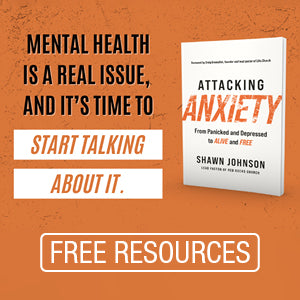Blog Articles and Resources for Pastors and Church Leaders
Blog Articles and Resources for Pastors and Church Leaders
Engaging the Cross This Easter
So why take this pilgrimage?
Because, while “It is finished,” He is not. His work on the Cross was perfect. Complete. Absolute. And because of it and through it, He continues working in and through us. The Cross is the singular basis of Christ’s total defeat of satan and his kingdom. satan had no response then and has none now. There’s nothing he can do about it. his defeat was complete, everlasting, and irrevocable. And while satan can’t change what happened on that Friday, he has been working ever since to hide what happened there. To obscure the work of the Cross. To avert our eyes. This is why Paul told the Galatians they’d been “bewitched.” Even though they were Spirit-filled eyewitnesses to the death and resurrection of Jesus, and God was actively doing miracles in their church, they’d taken their eyes off the Cross. Some power of darkness obscured the work of the Cross and they were focused on something else.
Embracing Radical Kindness - A Church Leader's Guide
How to Pick A Bible In Two Easy Steps
Experiencing God’s Unexpected Manifestations in your Life
Rediscover the rhythm of Advent and finding joy in waiting
3 Essential Truths About the Holy Spirit
Five Questions to Ask before Giving a Health-Related Sermon
How These Video Bible Studies for Kids Can Empower Parents
Is a kids Bible study that important?
Nineteenth-century evangelist D. L. Moody once said that if he could relive his life, he would devote his entire ministry to reaching children for God. A look at the statistics would tell us that Moody was right. The National Association of Evangelicals (NAE) found that 63% of people surveyed became a Christian between the ages of 4-14, with the median age being 11.
What Moody understood, and what we need to pay attention to today, is that involving kids in Bible study at the time they are most likely to make a decision to follow Jesus is the most important ministry our churches can have.
Five Reasons Your Church Needs a Small Group Ministry
Prayer - First Response, Not Last Resort
Why the Gospel is better than the enneagram
What is Lent and why should I observe and practice it?
Although Lenten practices vary depending on denomination and congregation, it generally includes three primary areas of focus: Prayer, Fasting, and Giving.
Being Unoffendable: The Ridiculous Idea
We won’t often admit this, but we like being angry. We don’t like what caused the anger, to be sure; we just like thinking we’ve “got” something on someone. So-and-so did something wrong, sometimes horribly wrong, and anger offers us a sense of moral superiority.
That’s why we call it “righteous anger,” after all. It’s moral and good, we want to think.
But inconveniently, there’s this proverb that says, “You may believe you are doing right, but the Lord will judge your reasons” (Prov. 16:2 NCV).
In the Beginning...
The first study in The Jesus Bible Study Series, Beginnings, is designed to usher you through the first act of God’s story, which is revealed most fully in the opening two chapters of the book of Genesis. Later biblical authors also wrote about God’s creation and the purposes behind his work, so we will pull from those portions of Scripture as well as we go along.


















